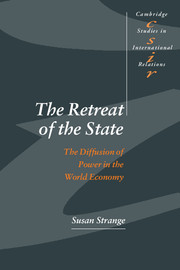Book contents
- Frontmatter
- Contents
- Preface
- Part I Theoretical foundations
- Part II Some empirical evidence
- 6 Authority beyond the state
- 7 Telecoms: the control of communication
- 8 Organised crime: the mafias
- 9 Insurance business: the risk managers
- 10 The Big Six accountants
- 11 Cartels and private protectionism
- 12 International organisations: the econocrats
- Part III Conclusions
- References
- Index
- CAMBRIDGE STUDIES IN INTERNATIONAL RELATIONS
11 - Cartels and private protectionism
from Part II - Some empirical evidence
Published online by Cambridge University Press: 07 October 2009
- Frontmatter
- Contents
- Preface
- Part I Theoretical foundations
- Part II Some empirical evidence
- 6 Authority beyond the state
- 7 Telecoms: the control of communication
- 8 Organised crime: the mafias
- 9 Insurance business: the risk managers
- 10 The Big Six accountants
- 11 Cartels and private protectionism
- 12 International organisations: the econocrats
- Part III Conclusions
- References
- Index
- CAMBRIDGE STUDIES IN INTERNATIONAL RELATIONS
Summary
A striking feature of the knowledge structure of the international political economy today is the slight attention given by social scientists to private protectionism, as compared with public or state protectionism. By that term I mean the intervention of firms with the operation of the free market. Such intervention may be unilateral. This is commonly the case when a single firm – a TNC – has a corporate strategy that limits competition between its various affiliates in different countries. Each one is master in its own territory and is not allowed to poach – i.e. compete with – another affiliate of the same company. There is also an element of private protectionism when a firm has monopoly control over a technology, or a system of marketing, or a brand-name that keeps away competitors. Some private protectionism is legitimised by governments as with pharmaceutical patents, or public procurement policies that discriminate in favour of a particular protected firm to the exclusion of others.
But private protectionism is also often multilateral. It works through an association of firms agreeing among themselves to limit their production, fix their prices and collectively manage their respective market shares. Typically, such market-managing agreements are based on the principle ‘dog does not eat dog’ – that is, each associate is given a free hand by the others in the home market where the large company is large and rich enough to quell any serious competition and to set prices as it pleases.
- Type
- Chapter
- Information
- The Retreat of the StateThe Diffusion of Power in the World Economy, pp. 147 - 160Publisher: Cambridge University PressPrint publication year: 1996

